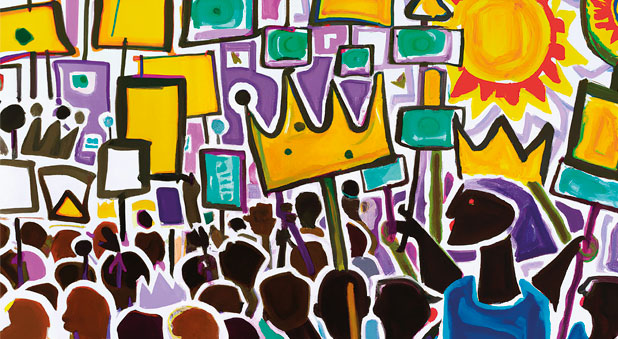Historically, there have been times when Christians have been in the majority, and have sought to wield their political power to create a “Christian nation”, embedding God’s laws in the laws of the nation.
We rightly recoil from this approach, and not just because we are no longer in the majority. Rather, we recognise that modern nations such as Australia are not, and are not meant to be, a theocracy like ancient Israel.
Ancient Israel was a theocracy because God established the nation by redeeming a people to himself, gave them his laws and decrees at Mt Sinai through Moses, and raised up kings, priests and prophets to lead his people to walk in his ways. Israel was God’s nation because Israel was the Lord’s “firstborn son” (Exod 4:23). If you belonged to the nation of Israel, then you were part of God’s people and under the rule of his law.
Those who refused to submit to God and his laws had to be “cut off” from the nation. For example, those who refused to observe the Sabbath (Exod 31:14), disobeyed the dietary laws (Lev 17:14) or despised the word of the Lord through defiant sin (Num 15:30-31) were to be “cut off”.
Some sins were so serious that “cutting off” a person meant capital punishment. For example, false prophets (Deut 13:5), false witnesses (Deut 17:7), murderers (Deut 19:13), rapists (Deut 22:24-25) and kidnappers (Deut 24:7) were to be put to death, in order to “purge the evil from among you”.
Church and nation
However, a significant shift occurs in the New Testament. Paul quotes the Deuteronomy formula to “expel the wicked” in 1 Cor 5:13, but with a twist. In response to unrepentant sexual immorality Paul calls for excommunication, not execution, as was required under the old covenant.
This is because there is now a differentiation between “church” and “nation” – a person can be put out of the church without having to be cut off from the nation.
This differentiation between Church and State has implications for Christian engagement with rulers and authorities.
Christians in the first century lived under sometimes hostile Jewish and Roman rulers. Notwithstanding this, the New Testament has a high view of governing authorities:
- All governing authorities (even bad ones) have been established by God, and Christians should submit themselves to these authorities. These authorities are God’s servants to promote good and punish evil (Rom 13:1-6, 1 Pet 2:13-14).
- Christians should pray for those in authority over us (1 Tim 2:1-2) and give them their due honour (Rom 13:7, 1 Pet 2:17).
- Sometimes Christians will be persecuted by the authorities. If Christians do good and suffer for it, they should endure unjust suffering, following the example of Christ (1 Pet 2:19-21).
- The limit of obedience to the State is the requirement to “obey God rather than human beings” (Acts 5:29).
The Roman Empire was an autocracy, not a democracy, and it is therefore not surprising that the New Testament does not encourage active political engagement, because there was no mechanism for this to occur. However, given this, it is important to note Paul’s willingness to use his rights as a Roman citizen (see Acts 16:37, 22:25, 25:11) when this could serve the gospel.
Democratic rights and the election
Christians in Australia today are part of a democracy. We have a democratic right to participate in political processes and to help shape policies and laws. Christians should not make the mistake of thinking that we have any greater right to participate or to be heard because of our faith, but conversely neither should we allow ourselves to be cowed into silence by those who seek to debar Christians from participating in public life. Many Christians in the world today do not have the privileges of democracy, and we should not take it for granted or squander it. Like Paul, we should use our rights as citizens wisely.
The NSW state election will be held on March 25. This provides an opportunity for Christians to exercise their democratic rights as citizens of this state to engage with those we elect to govern us for the next four years.
It is important for Christians to be informed about the values, principles and policies of those standing as candidates. For this reason, Meet the Candidate forums have been arranged in more than half of the electorates across NSW, many of them in local Anglican churches. There will be a limited number of set questions (e.g. freedom of religion, gambling and SRE) followed by an opportunity for questions from the floor.
To find a local Meet the Candidate event, visit the Freedom for Faith website here.
The Rt Rev Michael Stead is Bishop of South Sydney and chairman of Freedom for Faith.






















